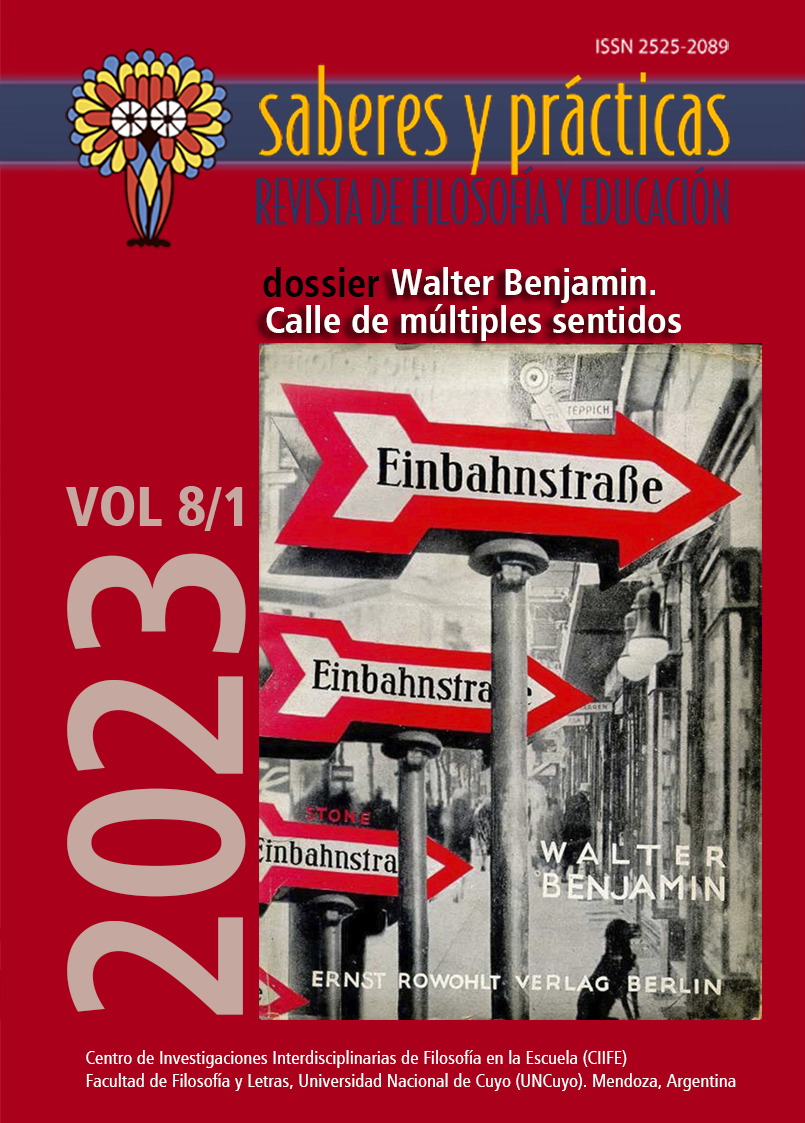One-Way Street: The revolutionary disruption
DOI:
https://doi.org/10.48162/rev.36.095Keywords:
Walter Benjamin, One-way Street, experience, Critical theoryAbstract
The article raises the problems that arise in attempting to coordinate an understanding of the peculiarities of Walter Benjamin's thought, especially with regard to his style of writing, with his revolutionary claims. The article suggests that the problems posed by this difficulty of coordination can be traced by taking as a common thread the predominance of a form of experience that reduces all sense and meaning to a system of equivalences. The rise and crisis of this model of experience is examined against the background of One-way street.
Downloads
References
Adorno, Th. (1968). Benjamins Einbahnstraße. En Über Walter Benjamin, Suhrkamp. Fráncfort del Meno.
Assmann, A. (2020). Is time out of joint? On the rise and fall of the modern time regime, Cornell University Press.
Benjamin, W. (1974). Gesammelte Schriften I/1, Suhrkamp, Fráncfort del Meno.
Benjamin, W. (2007). Obras. Libro II/vol. 1, Abada.
Benjamin, W. (2010). Obras. Libro IV/vol. 1, Abada.
Benjamin, W. (2012). El París de Baudelaire. Eterna Cadencia.
Bloy, L. (2015). Exégesis de los lugares comunes, Acantilado.
Bowie, A. (1997). From romanticism to critical theory. The philosophy of German literary theory, Routledge.
Buck-Morss, S. (2014). Walter Benjamin, escritor revolucionario, La Marca Editora.
Hegel, G.W.F. (1976). Ciencia de la lógica, Solar Hachette.
Hegel, G.W.F. (2005). Enciclopedia de las ciencias filosóficas, Alianza Universidad, Madrid.
Gilloch, G. (1997). Myth and metropolis. Walter Benjamin and the city, Polity Press.
Jameson, F. (1976). Marxism and form. Princeton University Press, Princeton.
Jennings, F. (2010). Walter Benjamin y la vanguardia europea. En Alejandra Uslenghi (comp.), Walter Benjamin: culturas de la imagen, Eterna Cadencia.
Kambeck, S. (2010). Das Fragment als Symbol in Walter Benjamins "Einbahnstraße", Grin.
Lindner, B. (1978). Links hatte noch alles sich zu enträtseln. En Burkhardt Lindner (comp.), Walter Benjamin im Kontext, Athenäum.
Marx, K. (1983). El manifiesto comunista, SARPE.
Moretti, F. (2014). El burgués. Entre la historia y la literatura, FCE.
Richter G. (2010). Una cuestión de distancia. La calle de dirección única de Benjamin a través de los pasajes En Alejandra Uslenghi (comp.), Walter Benjamin: culturas de la imagen, Eterna Cadencia.
Scholem, G. y Adorno, Th. (2012). The correspondence of Walter Benjamin. 1910-1940, University of Chicago Press.
Published
How to Cite
Issue
Section
License
Copyright (c) 2023 Jorge Armando Reyes Escobar
This work is licensed under a Creative Commons Attribution-NonCommercial-ShareAlike 2.5 Argentina License.





















